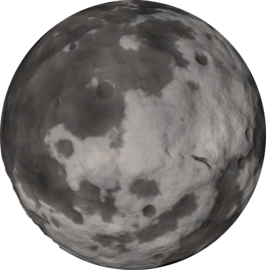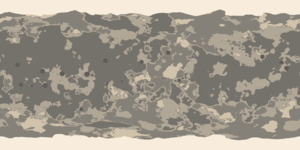Difference between revisions of "Dres"
DoctorKerman (talk | contribs) (→Cratering) |
Casualology (talk | contribs) (→Gallery) |
||
| Line 97: | Line 97: | ||
Bob_in_dres_canyon.png | Bob Kerman at the bottom of the big canyon roughly 3 kilometers below the actual lander. | Bob_in_dres_canyon.png | Bob Kerman at the bottom of the big canyon roughly 3 kilometers below the actual lander. | ||
Sunrise_over_dres_canyon.png | A beautiful sunrise over the big canyon. | Sunrise_over_dres_canyon.png | A beautiful sunrise over the big canyon. | ||
| + | File:Tumbler at Crater.jpeg|thumb|A rover in front of a Breaking Ground crater, next to the Dres canyon. | ||
</gallery> | </gallery> | ||
Revision as of 01:47, 29 March 2023
| Dres | ||
| Dres as seen from orbit. | ||
| Dwarf planet of Kerbol | ||
| Orbital Characteristics | ||
| Semi-major axis | 40 839 348 203 m [Note 1] | |
| Apoapsis | 46 761 053 692 m [Note 1] | |
| Periapsis | 34 917 642 714 m [Note 1] | |
| Orbital eccentricity | 0.145 | |
| Orbital inclination | 5 ° | |
| Argument of periapsis | 90 ° | |
| Longitude of the ascending node | 280 ° | |
| Mean anomaly | 3.14 rad (at 0s UT) | |
| Sidereal orbital period | 47 893 063 s | |
| 2 217 d 1 h 37 m 43.1 s | ||
| Synodic orbital period | 11 392 903.3 s | |
| Orbital velocity | 4 630 - 6 200 m/s | |
| Physical Characteristics | ||
| Equatorial radius | 138 000 m | |
| Equatorial circumference | 867 080 m | |
| Surface area | 2.3931396×1011 m2 | |
| Mass | 3.2190937×1020 kg | |
| Standard gravitational parameter | 2.1484489×1010 m3/s2 | |
| Density | 29 242.045 kg/m3 | |
| Surface gravity | 1.13 m/s2 (0.115 g) | |
| Escape velocity | 558.00 m/s | |
| Sidereal rotation period | 34 800.000 s | |
| 1 d 3 h 40 m 0 s | ||
| Solar day | 34 825.305 s | |
| 1 d 3 h 40 m 25.3 s | ||
| Sidereal rotational velocity | 24.916 m/s | |
| Synchronous orbit | 732.24 km | |
| Sphere of influence | 32 832 840 m [Note 1] | |
| Atmospheric Characteristics | ||
| Atmosphere present | No | |
| Scientific multiplier | ||
| Surface | 8 | |
| Splashed | N/A | |
| Near space | 7 | |
| Outer space | 6 | |
| Recovery | 6 | |
|
| ||
Dres is the fifth planet in the Kerbol star system. It is located between Duna and Jool in a somewhat eccentric and inclined orbit. It is considered to be the Ceres analog for the game. It is similar to Moho and Eeloo in that it has no atmosphere and no natural satellites (aside from a ring system of asteroids). Dres has the least gravity of any planet in the Kerbol system. Dres is considered a dwarf planet by the game because it has not "cleared its neighborhood"; in other terms, it has asteroids in close proximity.
Contents
In-game Description
| “ | Dres is a very small planet. It was the first planet considered to be a dwarf. It’s orbit is highly irregular and together with it’s size it took a long time to discover since half the time it was not where scientists expected to find a planet.
|
” |
Geography
The surface of Dres appears light grey and is rocky and uneven, similar to that of Mun, with a surface covered in regolith rubble. Unlike Mün, Dres has large patches of what appears to be ice. The highest points are just under 5.7 km in altitude. One notable geographic feature is a canyon which is called the "Dres Canyon" just south of the equator, which is several kilometers deep.
Cratering
The surface of Dres has several craters. However, unlike other planetary bodies, none are very prominent, the largest being slightly under 13 km in diameter.
In total, 42 craters have been positively identified. Another 5 are still waiting for confirmation. The spreading of the craters is biased to the western, particularly the northwestern, hemisphere of Dres.
| Quadrant | No. of craters (%) | No. of Craters |
|---|---|---|
| North-East | 19.0 % | 8 |
| South-East | 7.5 % | 4 |
| North-West | 42.9 % | 18 |
| South-West | 28.6 % | 12 |
| Total | N/A | 42 |
Biomes
Dres has 8 biomes.
Biome list
|
Interplanetary travel
From a 12 km Dres escape trajectory, the requirements for attaining an intercept trajectory of other celestials are:
| Body | Delta-V[1] | Phase Angle[2] |
|---|---|---|
| Kerbol[n 1] | ~5730 m/s | N/A |
| Moho | ~1510 m/s | -30º |
| Eve | ~770 m/s | -205º |
| Kerbin | ~670 m/s | -330º |
| Duna | ~530 m/s | -146º |
| Jool | ~410 m/s | 52º |
| Eeloo | ~580 m/s | 69º |
- ↑ 610 km orbit
Reference Frames
| Time warp | Minimum Altitude |
|---|---|
| 1× | Any |
| 5× | 10 000 m |
| 10× | 10 000 m |
| 50× | 30 000 m |
| 100× | 50 000 m |
| 1 000× | 100 000 m |
| 10 000× | 200 000 m |
| 100 000× | 300 000 m |
Gallery
- → Main article: Category:Images of Dres
A topographical projection map of Dres; accurate as of 0.18.
A topographical height map of Dres as of version 0.18.1; made with the ISA MapSat plugin.
Changes
- Added "Dres-teroid" belt (will appear randomly after achieving a flyby)
- Added biomes
- Initial Release
Trivia
- Dres was the subject of a Kerbal meme referring to the status of Dres as an interesting place or a boring place.
- KSP Youtuber Felsmak created a youtube video about how Dres is boring.
- Felsmak later made a video about how Dres is a hoax. This was a parody of the Bielefeld Conspiracy, not a serious video.
- This had led some forumers to start the Dres Appreciation thread, and others to fight back.
- That led to a flame war which essentially bled into unrelated forum posts.
- Felsmak closed the thread on his Dres Hoax video, stating that "This Dres meme has gotten kinda spammy now, it seems, and I don't really want to encourage it any further."
- According to the International Astronomical Union, Dres would be considered a planet as it does not share an orbit with any other objects.
- The Dres-teroid belt is not an analogue of the asteroid belt, but rather a diffuse ring of debris orbiting Dres. This means that Dres actually has an unknown and variable amount of natural satellites.
- According to the International Astronomical Union. This technically means that Dres has the most moons in the solar system. As there is not an official definition of what qualifies as a moon.
- Dres, Vall, Eeloo, and Moho are the only bodies in the solar system that are colored completely using a PQSMod_HeightColorMap. (Colors are based purely on the terrain height)







